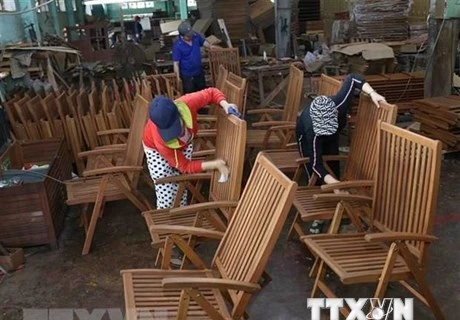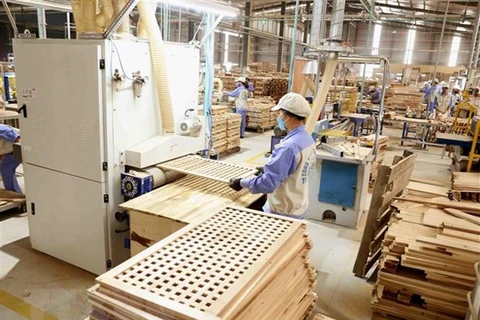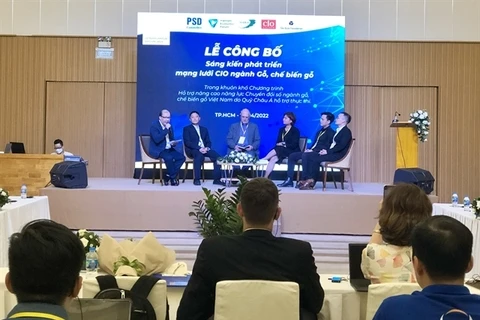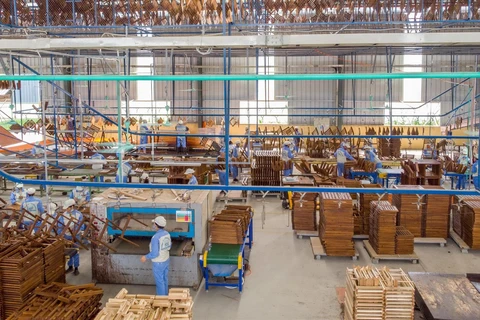Hanoi (VNA) – Vietnam is set to grant a licence under the Voluntary Partnership Agreement/FAO-EU Forest Law Enforcement, Governance and Trade (FLEGT) Programme to wood exports in 2025, after it completes preparing necessary conditions, reported a government official familiar with the sector.
Bui Chinh Nghia, Deputy General Director of the Vietnam Administration of Forestry, reported the new developments at a June 17 workshop held by the administration, the Vietnam Timber and Forest Product Association, and the Association of Handicraft and Wood Industry of Ho Chi Minh City (HAWA).
He pointed out that despite an annual double-digit growth rate, the country’s wood industry is still facing numerous challenges in 2022.
Apart from the pandemic, escalating political tensions have caused more challenges to supply chains, soaring logistics costs and material prices have resulted in higher input costs. Inflation in key export markets has led to a decrease in orders. In particular, accusations of material origin fraud also threaten industry development.
To cope with these challenges, he urged domestic businesses to adhere to international market regulations, enhance their capacity, and improve competitiveness so as to maintain their foothold in wooden furniture exports.
Echoing the view, HAWA Vice Chairman Nguyen Chanh Phuong said the compliance with regulations on sustainable forestry development is vital to the wood industry of not only Vietnam but also global markets.
At the workshop, the association launched HAWA DDS, a platform for proving and tracing wood origins.
Phuong noted that HAWA DDS, with support from the FAO-EU FLEGT Programme since May 2018, aims to remove obstacles in the wood origin validation process. This is a necessary step to prepare Vietnamese timber and wood products to access international markets, especially the EU.
By applying HAWA DDS, users from forest owners, processors to traders can search for information and prove material origins easily independent of manual procedures, he added./.
Bui Chinh Nghia, Deputy General Director of the Vietnam Administration of Forestry, reported the new developments at a June 17 workshop held by the administration, the Vietnam Timber and Forest Product Association, and the Association of Handicraft and Wood Industry of Ho Chi Minh City (HAWA).
He pointed out that despite an annual double-digit growth rate, the country’s wood industry is still facing numerous challenges in 2022.
Apart from the pandemic, escalating political tensions have caused more challenges to supply chains, soaring logistics costs and material prices have resulted in higher input costs. Inflation in key export markets has led to a decrease in orders. In particular, accusations of material origin fraud also threaten industry development.
To cope with these challenges, he urged domestic businesses to adhere to international market regulations, enhance their capacity, and improve competitiveness so as to maintain their foothold in wooden furniture exports.
Echoing the view, HAWA Vice Chairman Nguyen Chanh Phuong said the compliance with regulations on sustainable forestry development is vital to the wood industry of not only Vietnam but also global markets.
At the workshop, the association launched HAWA DDS, a platform for proving and tracing wood origins.
Phuong noted that HAWA DDS, with support from the FAO-EU FLEGT Programme since May 2018, aims to remove obstacles in the wood origin validation process. This is a necessary step to prepare Vietnamese timber and wood products to access international markets, especially the EU.
By applying HAWA DDS, users from forest owners, processors to traders can search for information and prove material origins easily independent of manual procedures, he added./.
VNA
























